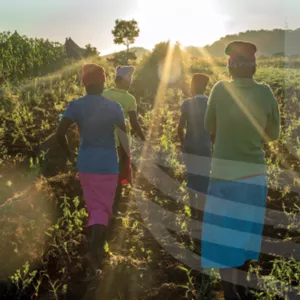The Agroecology Transition: Different pathways to a single destination - Eight country experiences
A brochure briefly profiles the eight participating countries, describing key features of their agricultural living landscapes and the entry points for their agroecology transitions Download the brochure Agroecology is a transdisciplinary, participatory, and action-oriented approach for co-designing options that enhance food system resilience, equity, and sustainability. Working in eight countries of the Global South, the CGIAR Initiative on Agroecology seeks

The Agroecology Transition: Different pathways to a single destination - Eight country experiences
A brochure briefly profiles the eight participating countries, describing key features of their agricultural living landscapes and the entry points for their agroecology transitions
Agroecology is a transdisciplinary, participatory, and action-oriented approach for co-designing options that enhance food system resilience, equity, and sustainability. Working in eight countries of the Global South, the CGIAR Initiative on Agroecology seeks effective ways to put this approach into practice.
In each country, the Initiative concentrates on one or two distinct territories referred to as “agroecological living landscapes” (ALLs), where it engages with researchers, farmers and their associations or communities, private companies, international and national non-governmental organizations as well as local, regional, and national policymakers. Their shared aim is to achieve a mutually defined agroecological transition by:
- Building evidence on the performance of co-designed innovations
- Identifying business opportunities and financial mechanisms for local enterprises to support agroecology innovations
- Devising behavior change strategies and action plans oriented to agroecology principles
- Developing policies to promote agroecology transitions
With food system actors (FSAs) and partners in each country, the Initiative has identified various entry points for the agroecology transitions, which are tailored to specific ALL contexts through a vision-to-action process with food system actors. The ALLs differ markedly in terms of climate, farming systems, soils, and other conditions that rural communities face. In seeking suitable entry points, the Initiative has built on important experience that each country gained previously in applying some of the 13 agroecology principles.

The Initiative involves 101 multidisciplinary staff (47 female and 54 male), who work with more than 35 partner organizations. It is also developing a holistic localized performance assessment (HOLPA) framework to measure context-specific progress in the agroecology transitions. Solid evidence of progress is critical for opening the way to wider implementation of agroecology.
More than 4,400 food system actors in the ALLs in eight countries have identified context-specific agroecology transitions through the vision-to-action processes and begun testing agroecological practices as well as designing suitable business models and financial mechanisms. They have also participated in strategic policy discussions at the national and regional levels and have joined existing networks and working groups. In addition, options have been explored for ways to influence social behavior to be more aligned with agroecology.
This brochure briefly profiles the eight participating countries, describing key features of their ALLs and the entry points for their agroecology transitions using the five levels proposed by Gliessman and as adapted by Wezel et. al. in 2020 (see Figure 1). It demonstrates the wide relevance of agroecology and the versatility of the Initiative’s approach for pursuing agroecology transitions.

